Iranian Lawmaker Warns Of Insecurity From Currency Devaluation

Mehdi Toghyani, the spokesperson for the Economic Committee of the Iranian Parliament, has pointed to currency instability as a factor contributing to national insecurity.

Mehdi Toghyani, the spokesperson for the Economic Committee of the Iranian Parliament, has pointed to currency instability as a factor contributing to national insecurity.
"The problem of insecurity is not solely caused by warfare instigated by enemies, but also by the currency policies that devastate the people’s morale," Toghyani stated during a parliamentary session.
In a related development on Sunday, another lawmaker, Sodeif Badri, criticized the Central Bank of Iran for its failure to provide necessary foreign currency for raw material imports, intensifying the crisis triggered by the falling rial. Badri, a conservative politician, highlighted the dire situation in the nation's industrial sectors, stating, "The Central Bank tells producers that it has no currency," thereby shedding light on the shortages impacting production and economic stability.
Since arly January, the rial has lost more than 30 percent of its value against the US dollar.
The foreign exchange market saw the dollar breaching the 700,000 rials mark over the last weekend following the Islamic Republic's attack on Israel. The rate somewhat decreased to 650,000 rials in the past few days.
The plummeting value of the rial has exacerbated inflationary pressures in Iran, where the annual inflation rate has hovered around 50 percent for the past five years. In 1978, the rial was valued at 70 rials per dollar. The devaluation over the decades has led to millions of Iranians falling below the poverty line.
Iranian authorities have often downplayed the impact of US and other international sanctions on the economy. However, the continuing high inflation rates have eroded the middle-class, with tens of millions of people now subsisting on approximately $200 a month, significantly below what is needed to maintain a middle-class lifestyle in Iran.
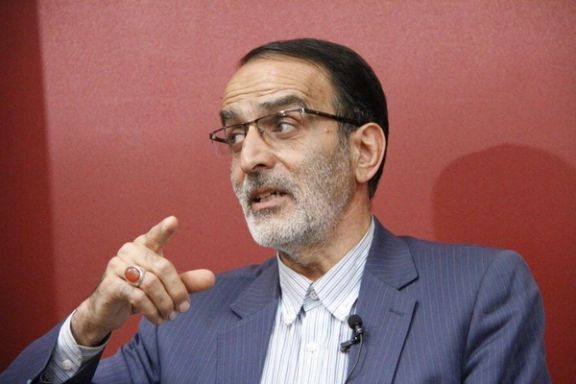
Iranian lawmaker Javad Karimi Ghoddusi says there is only "a one-week gap from the issuance of the order to the first test" of a nuclear bomb, despite previous assertions of peaceful intentions.
His Monday statement on X came amidst escalating tensions with Israel and just hours after the Iranian foreign ministry reiterated that nuclear weapons have no place in Iran's military doctrine.
Ghoddusi, who is known for his hardline stance in domestic and foreign policy, also made provocative comments prior to Iran's missile and drone attack against Israel, warning that attempts to assassinate 'Resistance Front' personalities worldwide would be met with retaliation with Iranian missiles.
During a press briefing in Tehran, ministry spokesperson Nasser Kanaani emphasized, "Nuclear weapons have no place in our nuclear doctrine."
The mention of a doctrine has often been made in reference to what’s known as the Supreme Leader’s so-called “nuclear fatwa” – an alleged Islamic ruling issued by Khamenei banning the development of nuclear weapons.
However, experts challenge the authenticity and the binding nature of the fatwa, suggesting it has been used strategically to deflect international scrutiny over Iran's nuclear ambitions.
Moreover, Islamic Revolutionary Guard general Ahmad Haghtalab recently hinted that threats from Israel could force Iran to "review its nuclear doctrine and deviate from its previous considerations." The admission suggests potential shifts in Iran’s nuclear strategy in response to external military pressures.
While the foreign ministry maintains a façade of peaceful intentions, nuclear experts are skeptical, pointing out that Iran's uranium enrichment to 60-percent purity since 2021 suggests a direction towards weaponization.
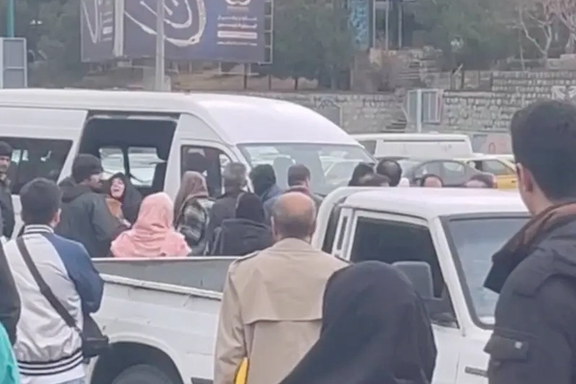
As Iran's Islamic government tightens its grip on enforcing mandatory hijab, reports of extortion and abuse of Iranian women at the hands of hijab enforcement officers have surfaced.
According to information obtained by Iran International, instances of Iranian police officers demanding money from women to avoid hijab-related arrests have come to light. The coercion further extends to confiscating valuables and personal belongings from citizens.
Since the implementation of the new hijab enforcement plan, "Project Nour" on April 13, a wave of violent encounters targeting unveiled women has unfolded across various cities in Iran. Victims recount disturbing experiences of being accosted by Iran’s so-called “morality police", with some revealing instances of sexual harassment.
In one account, a woman revealed that the police coerced her and several others into paying 100 million rials ($153) under threat of arrest or seizure of their vehicles.
In another account, after arresting a woman, the police officer took out a card from his pocket and demanded that the woman “deposit 120 million rials ($184)” into the account shown on the card as a condition to release her.
Furthermore, three additional women told Iran International that following their arrests upon arriving at the police stations and surrendering their belongings, they discovered upon release that their jewelry pieces were missing from their possessions. Their attempts to reclaim their belongings were met with hostility and denial by the officers responsible.
In addition to extortion, there have been numerous instances of confiscated cell phones, further infringing on the rights of those targeted by hijab enforcement officers.
The intensified crackdown on women had already escalated to the point where women were reporting physical assault and verbal sexual abuse during encounters with the morality police last week.
The renewed emphasis on enforcing compulsory hijab regulations has been endorsed by Iran's highest authorities, including Supreme Leader Ali Khamenei, President Ebrahim Raisi, and the head of Iran's judiciary Gholamhossein Mohseni Ejei.
This new wave of egregious violations against women and girls in Iran has exacerbated the oppression they face, living under the rule of the Islamic Republic regime, particularly amidst a growing movement of nationwide hijab defiance.
Many mid-ranking clerics, some insider politicians and commentators have been voicing concern over the illegal and harsh enforcement measures. They warn that this will widen the gap between the population and the rulers, while increasing the chances of new unrest in the country.
In 2022, the death of 22-year-old Mahsa Amini after her arrest by the morality police led to months of nationwide protests, posing the biggest threat the Islamic government had faced in its four-decade rule. Security forces killed around 550 civilians and arrested 22,000 before the unrest was suppressed.
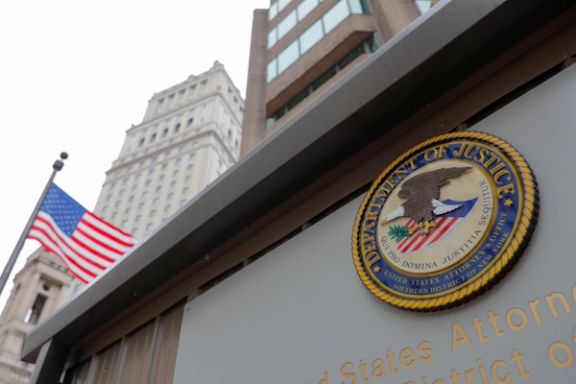
The US State Department on Monday released its annual report on Iran's human rights situation, stressing that the country's "already severe restrictions on human rights worsened in a number of areas" during 2023.
The report outlines an increase in government restrictions and violence against citizens. It also highlights discriminatory laws and executions, including those of juveniles. It documents arbitrary killings, enforced disappearances, and widespread torture by the Iranian government forces aimed at suppressing any opposition.
“Women continued to face discrimination, including through enhanced means for enforcing the mandatory dress code, which led to acts of civil disobedience,” read the report.
Notably, the report mentions the sharp increase in executions, with 798 citizens executed, marking a 37% rise from the previous year. Many of these executions involved minor or politically motivated charges, often after unfair trials or forced confessions, the report said. “There were numerous reports that the government or its agents committed arbitrary or unlawful killings, including extrajudicial killings, during the year.”
The role of the Iranian judiciary, especially the Revolutionary Courts, is particularly criticized for denying fair trial rights and due process.“As documented by international human rights observers, so-called revolutionary courts continued to issue the majority of death sentences and failed to grant defendants due process,” read the report, adding that the courts “regularly denied defendants legal representation and, in many cases, solely considered as evidence confessions often extracted through coercion or torture.”
The report also discusses severe restrictions on freedoms of expression, assembly, religion, and the press, with the government imposing harsh penalties on those who dissent. Internet and media freedoms are severely curtailed, with the regime employing censorship, surveillance, and intimidation to control information and suppress activism.
The US State Department specifically singled out the Islamic Republic’s threats against Iran International journalists, which forced the network to temporarily relocate its studios to Washington.
“In February, media outlet Iran International temporarily relocated its headquarters from London to Washington, DC, after London’s Metropolitan Police warned the organization that their journalists were facing threats that posed an imminent, credible and significant risk to their lives and those of their families,” the report noted.
The report also referred to a statement by Iranian Intelligence Minister Esmail Khatib, who said in November 2022 that “the Islamic Republic recognized Iran International as 'a terrorist organization' and that anyone affiliated with the channel would be pursued.”
Additionally, the report underscores the plight of ethnic and religious minorities, who face systemic violence and discrimination. It also notes the government's failure to address gender-based violence and the mistreatment of women and LGBTQ+ individuals.
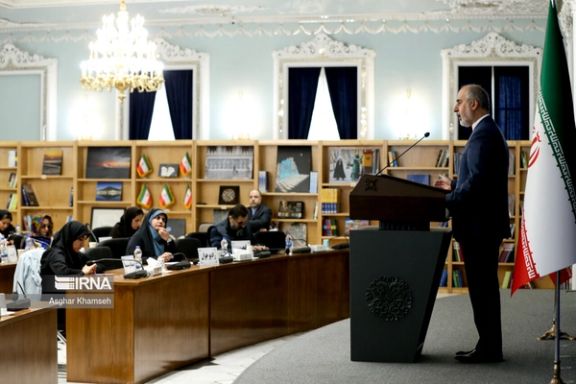
The spokesperson for the Iranian Foreign Ministry denied Monday that the Swiss ambassador in Tehran was summoned by the Revolutionary Guards over recent tensions between Iran and Israel.
The controversy began last week when Mojtaba Abtahi, an advisor to the minister of interior, claimed that "At 3 AM on Monday, April 14, when the Iranian attack on Israel was nearly finished, the Swiss ambassador, representing US interests, was summoned not to the ministry of foreign affairs, but to a Revolutionary Guards base."
The story was backed by a report in The New York Times, which stated that during the attack on Israel, the Swiss ambassador was indeed summoned, but to a Guards' base.
In a press conference on Monday, Nasser Kanaani claimed that "there has been continuous contact with the Swiss ambassador in Iran, and the diplomatic apparatus has acted completely professionally." He also highlighted Switzerland's role as a crucial conduit for diplomatic communications between the US and Iran.
Such a move would be a breach of diplomatic protocol, as traditionally, any official dealings with an ambassador -- even those concerning military or economic issues -- are managed by the host nation's foreign ministry. The alleged bypassing of official diplomatic channels is another proof for the potential sway of the Guards over the Iranian foreign ministry.
Last Saturday, Tehran launched 350 or more missiles and combat drones in retaliation for Israel’s April 1 air strike on the Iranian consulate in Damascus, killing a senior IRGC-Quds Force commander and several IRGC personnel. Israeli forces, backed by the US and other allies, intercepted approximately 99%, while the few that survived caused only minor damage. On Friday night, an air defense system at an Iranian air base in Isfahan was hit by an Israeli attack.
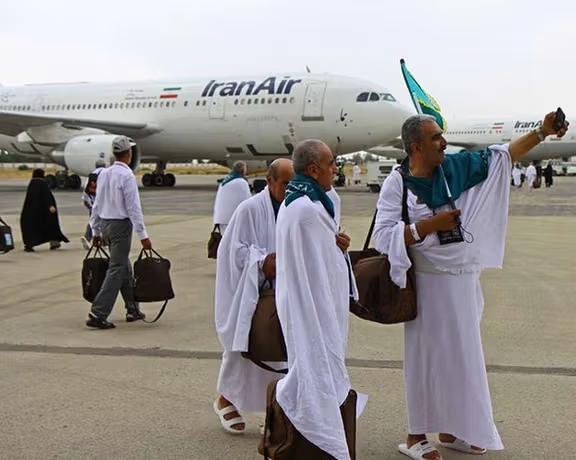
For the first time in nine years, Iran has resumed sending Muslim pilgrims to Saudi Arabia for Islamic pilgrimage to Mecca, after receiving approval from Riyadh.
Two groups, each consisting of 85 people from Iran, began their journey to Saudi Arabia to perform what’s known as the Umrah.
The non-mandatory Islamic pilgrimage can be undertaken at any time of the year, unlike the Hajj which has specific dates according to the Islamic lunar calendar.
After years of diplomatic estrangement between Tehran and Riyadh, and an initial cancellation of the flights, the first departure was marked on Monday from Tehran’s main airport.
Representatives of Supreme Leader Ali Khamenei and Saudi Arabian Ambassador to Iran, Abdullah bin Saud Al-Anzi, were reportedly in attendance.
Nearly two years ago, with mediation from China, Tehran and Riyadh reached an agreement to reopen embassies and exchange ambassadors, thereby restoring diplomatic ties.
In 2016, Saudi Arabia severed ties with Iran after protesters stormed its embassy in Tehran. This occurred amid waves of protest against Riyadh's execution of a Shiite cleric.
Relations deteriorated further due to subsequent events, including missile and drone attacks on Saudi oil facilities and tankers in the Persian Gulf, carried out by Iran-backed Houthi militia in Yemen.
On Monday, Iran announced that it would operate two daily flights, each carrying 260 passengers, from various cities across the country.
The flights are set to continue until May 12 from different airports, with a total of 44 round trips scheduled, to fly 5,610 Iranian pilgrims to Saudi Arabia.






